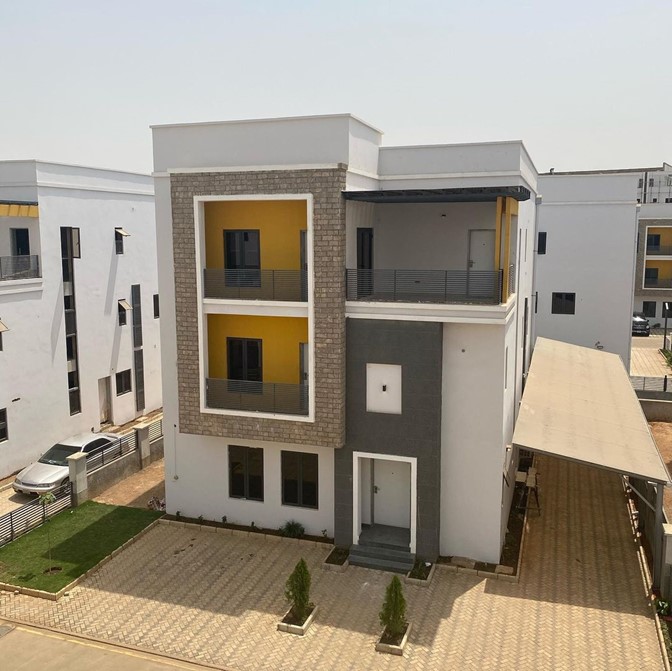Introduction
Starting a property business in Nigeria isn’t just about buying and selling buildings—it’s about tapping into the heartbeat of a nation pulsating with growth, urbanization, and dreams of owning a piece of the booming real estate pie.
Imagine this: bustling city streets lined with towering skyscrapers, cozy residential neighborhoods teeming with life, and vibrant commercial hubs buzzing with activity. That’s the canvas upon which you’ll paint your entrepreneurial masterpiece—a world where every property holds the promise of profit and the potential to transform communities.
But before you dive headfirst into the fray, take a moment to map out your journey through the maze of Nigerian real estate. From navigating legal labyrinths to mastering the art of deal-making, So, grab your hard hat, polish your negotiation skills, and get ready to conquer the world of property business in Nigeria—one brick at a time!
1. Understand the Nigerian Property Market:

To start a property business in Nigeria, understand the Nigerian property market.
The Nigerian property market is a dynamic landscape shaped by a convergence of demographic, economic, and urbanization forces. With a population exceeding 200 million, Nigeria boasts a youthful demographic hungry for housing, offering a promising market for residential and commercial properties. Urbanization, a key trend, propels the demand for real estate, as people flock to cities in pursuit of better opportunities, amplifying the need for strategically located properties.
Economically, Nigeria’s diversifying sectors contribute to a resilient market. The oil and gas industry, telecommunications, banking, and agriculture play pivotal roles, driving demand for various types of properties. However, challenges such as regulatory complexities, land tenure issues, and infrastructure deficits exist, demanding a nuanced understanding.
Navigating this dynamic market requires a keen eye for emerging trends, an awareness of economic shifts, and a strategic approach to address challenges. As Nigeria continues its developmental journey, the savvy property entrepreneur must grasp the intricacies of this ever-evolving market, seizing opportunities and mitigating risks to thrive in the exciting realm of Nigerian real estate.
2. Identify Your Niche:
To set up a property business in Nigeria, identify your niche.
The Nigerian property market offers a wide range of opportunities, including residential, commercial, retail, and industrial properties. Identifying your niche based on market demand, personal interests, and expertise is essential for success. Whether you choose to focus on rental properties, real estate development, property management, or real estate investment trusts (REITs), clarity on your niche guides your business strategy and decision-making process.
3. Develop a Business Plan:
To begin a property business in Nigeria, develop a business plan.
A well-crafted business plan serves as a roadmap for your property business. It should outline your business objectives, target market, competitive analysis, marketing strategy, financial projections, and risk management plan. Your business plan will not only help you secure financing but also provide a framework for monitoring progress and adjusting strategies as needed.
4. Navigate Legal and Regulatory Compliance:
To lay the foundation of property business in Nigeria, navigate legal and regulatory compliance.
Legal and regulatory compliance is a cornerstone of success when venturing into the property business in Nigeria. The country’s legal framework regarding real estate is multifaceted, encompassing various laws, regulations, and procedures that must be adhered to ensure smooth operations and mitigate legal risks.
One of the primary aspects of legal compliance is business registration. Entrepreneurs looking to start a property business in Nigeria must register their company with the Corporate Affairs Commission (CAC) and obtain the necessary business permits and licenses. This process ensures that the business operates within the confines of the law and is recognized as a legal entity.
Nigeria operates a dual system of land tenure, consisting of statutory (government-owned) land and customary (community-owned) land. Depending on the location and type of property, different rules and regulations may apply regarding land acquisition, ownership documentation, and title registration.
In Nigeria, the rate at which property tax is payable annually varies depending on the type of property. Here’s a breakdown of the tax rates:
- Recreational Property: Owners of recreational properties, such as parks, leisure centers, and sports facilities, are required to pay property tax at a rate of 0.3% of the property’s assessed value annually.
- Residential Property: Residential property owners, including those with single-family homes, apartments, or condominiums, are subject to an annual property tax rate of 0.4% of the property’s assessed value.
- Commercial Property: Commercial property owners, which include office buildings, retail spaces, and industrial facilities, are obligated to pay property tax at a rate of 0.6% of the property’s assessed value each year.
- Other Property: This category encompasses properties that do not fall under the recreational, residential, or commercial classifications. Owners of such properties are required to pay property tax at a rate of 0.7% of the property’s assessed value annually.
Furthermore, zoning regulations and building codes govern property development and construction activities in Nigeria. These regulations dictate permissible land uses, building heights, setback requirements, and other parameters that you must adhere to when planning and executing property development projects. Violating zoning laws or building codes can result in costly fines, delays, or even the demolition of non-compliant structures.
5. Secure Funding:
To start a property business in Nigeria, secure funding.
Capital is a critical requirement for starting a property business in Nigeria. Whether you’re self-financing, seeking loans from financial institutions, or attracting investors, securing adequate funding is essential for acquiring properties, covering operational expenses, and sustaining growth. Explore various financing options and develop a robust financial plan to demonstrate viability and attract potential investors or lenders.
6. Acquire Properties:
To kick start a property business in Nigeria, acquire properties.
Acquiring properties is the core activity of any property business. Conduct thorough market research to identify properties that align with your investment goals and target market preferences.
When considering property acquisition in Nigeria, several key locations stand out for their investment potential. Lagos, as the commercial capital, offers diverse opportunities across neighborhoods like Ikoyi, Victoria Island, and Lekki, fueled by a booming economy and ongoing infrastructure projects. Abuja, Nigeria’s capital city, boasts stability and growth, particularly in upscale areas such as Asokoro, Kubwa, Bwari and Maitama, making it a prime choice for residential and commercial investments.
Port Harcourt, a major economic center in the Niger Delta region, presents opportunities in residential and industrial properties, with areas like GRA Phase 2 and Trans-Amadi Industrial Layout seeing increased demand. The Lekki-Epe axis along the expressway in Lagos State is witnessing rapid development, attracting investors to its upscale residential estates and commercial centers, driven by projects like the Lekki Free Trade Zone.
Enugu, known as the “Coal City,” is emerging as a commercial and industrial hub in southeastern Nigeria, with areas like Independence Layout and GRA Enugu offering attractive investment prospects. When exploring property acquisition in these locations, thorough research, consideration of infrastructure and demographics, and consultation with local experts are essential to capitalize on Nigeria’s dynamic real estate market.
7. Develop a Marketing Strategy:
To begin a property business in Nigeria, develop a marketing strategy.
Effective marketing is essential for attracting tenants, buyers, or investors to your properties. Utilize a mix of online and offline marketing channels, including social media, property listing websites, signage, and networking events, to reach your target audience. Highlight unique selling points, such as property amenities, location advantages, and investment potential, to differentiate your offerings in the market.
8. Build a Reliable Network:
To kick off a property business in Nigeria, build a reliable network.
Networking plays a crucial role in the success of a property business. Establish relationships with real estate agents, property developers, legal professionals, contractors, and other industry stakeholders to access valuable resources, insights, and opportunities. Cultivate a reputation for professionalism, integrity, and reliability to foster trust and credibility within the real estate community.
9. Implement Efficient Property Management:
To commence a property business in Nigeria, implement efficient property management.
This is vital for maximizing returns and maintaining tenant satisfaction. Develop systems and processes for property maintenance, rent collection, tenant screening, lease agreements, and dispute resolution. Utilize technology, such as property management software, to streamline operations and enhance productivity. Prioritize proactive communication and responsiveness to address tenant needs and ensure property performance.
Summary
Starting a property business in Nigeria offers immense potential for individuals seeking to capitalize on the country’s growing real estate market. By understanding market dynamics, identifying a niche, developing a solid business plan, complying with legal requirements, securing funding, acquiring properties, implementing effective marketing and management strategies, building a reliable network, and staying informed and adaptable, aspiring entrepreneurs can lay the foundation for a successful and sustainable property business venture. With diligence, perseverance, and strategic execution, the journey to entrepreneurial success in Nigeria’s property sector awaits.


















